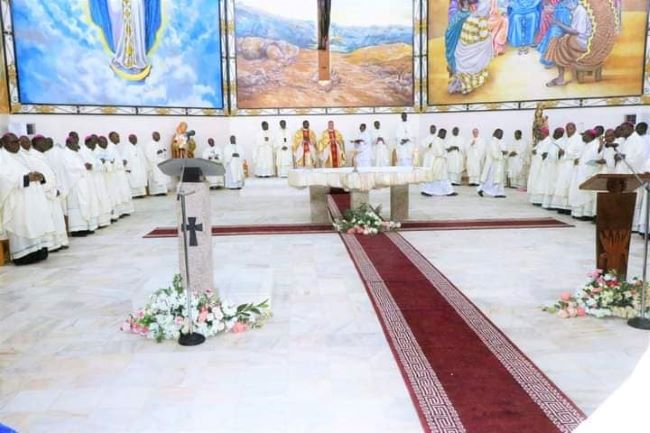Maroua: Roman Catholic bishops denounce Boko Haram atrocities
Catholic bishops in Cameroon, which has been gripped by civil conflict for the past seven years, have denounced rising poverty in the country as well as violence associated not only with a separatist movement in English-speaking regions but also atrocities committed by Boko Haram insurgents.
In a release at the end of their Jan. 6-13 annual assembly in Maroua, in the country’s far north region, the bishops expressed concern that the country is under siege from both terrorists and belligerents, a situation they said is worsening the poverty in Cameroon.
“The bishops denounce the horrendous acts perpetrated by the Boko Haram sect in the far north region and they express deep compassion for the victims,” they said in a statement signed by the Secretary General of the Cameroon Bishops’ Conference, Father Jervis Kebei Kewi.
There are an estimated ten million Catholics in Cameroon, representing roughly 40 percent of the overall nation population, and the Church has long had enormous influence in the country. Among other things, the country’s President-for-life, Paul Biya, is a former Catholic seminarian.
The northern parts of Cameroon have been a flash point of Boko Haram attacks since 2014, when the terrorists, whose origins are in Nigeria, began expanding their terrifying campaign to Nigeria’s neighbours of Cameroon, Chad, and Niger. Its stated aim is to create an Islamic caliphate across the Sahel region of Africa.
According to the United Nations, at least 350,000 people had been killed by the terrorist group. In 2019, the group killed at least 275 Cameroonians, according to Amnesty International.
Bishop Bruno Ateba Edo of Maroua-Mokolo said that more than 320,000 people have fled the region as a result of the Boko Haram attacks. The UN has warned that if the conflict continues, more than 1.1 million people may die by 2030.
Beyond the Boko Haram insurgency, the bishops deplored all violence, particularly atrocities committed by both separatist fighters and government soldiers in Cameroon’s troubled English-speaking regions of the northwest and southwest.
For seven years the two regions have been embroiled in a separatist war that had killed at least 6,000 people as of January 2023 (which is considered a conservative estimate) and displaced at least 700,000 people.
The crisis broke out in 2016 when Anglophone teachers and lawyers took to the streets to protest the use of French in Anglophone schools and courts. The government took a hardline stance, and what was initially a peaceful protest degenerated into political violence.
A separatist group grew and started fighting for the independence of Cameroon’s Anglophone population, which represents 20 per cent of the country’s 27 million inhabitants, and the formation of a new nation to be called Ambazonia.
“Destruction and displacement have set back development in the region by decades, and continued conflict will only further scar the region,” the United Nations Development Program said.
“We think that all Cameroonians should be open to love peace, to work for peace, and to ensure that Cameroon is in peace,” said the President of the National Episcopal Conference of Cameroon, Archbishop Andrew Fuanya Nkea of Bamenda.
“We have a right to live in peace, and that is why we are calling on all the stakeholders to put their hands on deck to ensure that this 2024 be a year of real peace in the whole of Cameroon,” Nkea said.
“We all understand that there is insecurity in the northwest and the southwest regions and in the far north region. We have come here to pray for peace and to join the people of the far north region to pray for peace,” Nkea said.
He said the calls for a return to peace are imbued with greater significance in the month of January “when Christians as a whole and men of goodwill pray for peace in their hearts and in the world”.
“This is the same peace that the Lord Jesus Christ wished for his apostles on the morning of the resurrection, when he said to them, ‘Peace be with you’,” Nkea said.
The bishops expressed “constant paternal solicitude and continual prayer” for all victims of violence.
The church leaders further expressed concern over the “growing and yawning poverty among the population”.
According to the World Bank, Cameroon was ranked 150 out of 189 in the 2019 Human Development Index, with 39 per cent of Cameroonians living below the poverty line. The index reports that between 2007-2014, the overall number of poor in Cameroon increased by 12 percent to 8.1 million, with much of the poverty concentrated in the country’s northern regions that hosts 56 percent of the country’s poor.
The bishops appealed “for greater justice, solidarity, hard work and continuous trust in God”.
The assembly was organized under the theme “A Synodal Church on Mission”. Bishop Michael Bibi of Buea told Crux that it was an opportunity for the prelates to “reflect on how they can continue to work together for the good of the people of God in Cameroon”.
He said this year’s theme grew naturally from the October synod that took place at the Vatican on Synodality, which means “people working together as members of one family for the good of the Church”.
Source: Catholic Herald





